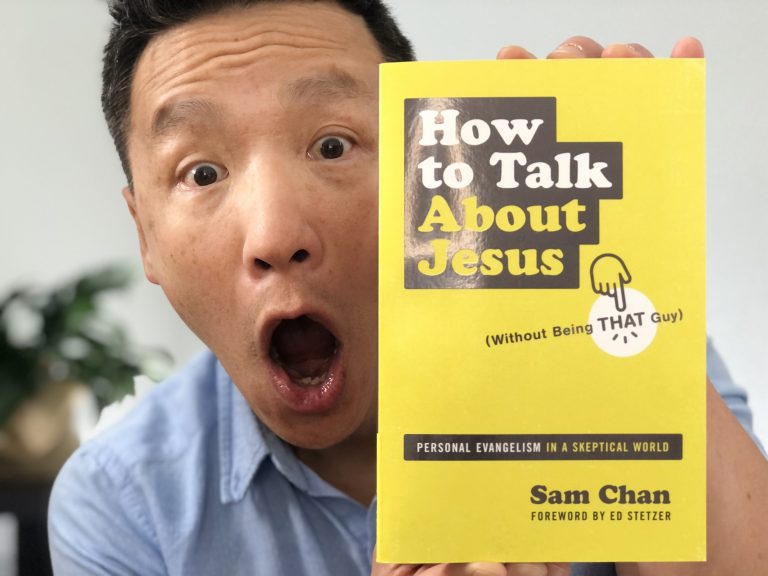 Dr Sam Chan is a public evangelist with the City Bible Forum in Sydney, where he regularly shares the gospel with high school students, city workers, doctors and lawyers. He’s also the author of the award-winning book, Evangelism in a Sceptical World.
Dr Sam Chan is a public evangelist with the City Bible Forum in Sydney, where he regularly shares the gospel with high school students, city workers, doctors and lawyers. He’s also the author of the award-winning book, Evangelism in a Sceptical World.
Now Sam has written another book about evangelism designed to equip the everyday Christian to tell their friends and family about Jesus: How to Talk About Jesus (Without Being THAT Guy). This book is highly practical and extremely readable – a great companion to his previous book but also an excellent standalone resource.
MTS was thankful for the opportunity to sit down with Sam to speak about his book, the changing nature of evangelism, and how being in ministry impacts the evangelistic conversations we are able to have. Check it out!
Sam, when people ask you what your new book is about, what do you say?
It’s in the DNA of every Christian to want to tell their friends about Jesus. But at the same time, we live in a society which is so post-Christian, it’s awkward to talk about Jesus in public. So, we get caught in this thing where we want to tell our friends about Jesus, but it feels socially inappropriate. So how can we do it in a non-awkward, non-cringe-worthy way? That’s what the book is about.
Also, the book sort of fills a hole. Normally if you get trained in evangelism, you get trained in one of two things. One is how to give a 20-minute Bible talk at an evangelistic event, like a craft night, or men’s breakfast. Or we get trained on how to do walk-up evangelism, where we walk up to a stranger on a university campus, and we talk to them about Jesus.
But there is big space in the middle. How do I tell my friends and family about Jesus?
Walk-up often goes surprisingly well, because everyone realises we’re not going to see each other ever again, so we can talk about deeper, meaningful stuff. Even if we conflict or argue, we’re not going to see each other ever again. And also, the event talk is surprisingly easy as well, because it’s a 20-minute monologue, so we get to dictate the terms. We own the conversation.
But what do you do in this space in the middle with friends and family, who we have to see over and over again? We don’t want to risk the friendship by talking about Jesus. We’re always told not to talk about politics or religion. But here we are talking about religion! There is a fear that it won’t go well, that this is going to end badly, that we might lose a friendship, or we might cause an argument, or it just will be really, really awkward.
That’s why this book exists.
Apart from feeling uncomfortable, what are the other challenges we have to overcome in our evangelism?
Once upon a time, people thought Christians were the do-gooders, and that to be a Christian, you go to church, you can’t have sex, you don’t go to parties, you don’t drink alcohol, you do ‘good things’. So back then, we needed to explain that Christianity not about doing good things – it’s about grace.
But now they think we’re the haters, the racists, the oppressors, the bigots. The narrative has flipped. Nowadays, people think Christians are the bad guys in the narrative. That’s something we need to realise in our ministry.
My boss Mark Leong at City Bible Forum, he’s been evangelising this guy for the last two or three years. And he actually just became a Christian last month! But his biggest fear was, if I become a Christian, am I going have to hate gay people? That was his perception of Christianity.
The analogy I give is, 20 years ago we were evangelising the prodigal son, the one who went away from the Father who knew he was doing the wrong thing, and he had to come back. Or we were evangelising the tax collector who cries out, “Lord, have mercy on me.” But now, we’re actually evangelising the Pharisee, the one who’s morally upright and self-righteous, because that’s the average non-believer now.
What worked many years ago worked very well with a different audience who thought we were trying to do good things, but now our audience thinks we are the bad guys.
That sounds tough. So how do we overcome our fears about being awkward, AND the views of non-Christians that Christians are the bad guys?
I think a big encouragement is that there’s a research group called Barna, and they’ve surveyed all these non-Christians, and they found that the average non-Christian may have a problem with Christianity, this abstract idea of Christianity, but they don’t have a problem with the Christian friends that they know. So, they actually don’t mind a Christian talking about Jesus, surprisingly!
I just stumbled upon a verse in Exodus as well, in Exodus 12:36. It says, “The Lord had made the Egyptians favourably disposed toward the people, and they gave them what they asked for.” The Egyptians gave the Israelites gold, silver and clothing when they left. We often think about the Egyptians as Pharaoh, who hated and oppressed and was cruel to the Israelites. But the average Joe Egyptian liked the Israelites.
It’s the same with us. If all we read is the media, social media, we feel like we’re being oppressed. Everyone hates us. And that might be true on one level, but that’s a very “top-down” thing. But on a “bottom-up” level, the average non-believer in Australia, who we’re friends with, they love us!
So what we need to do is to make them feel safe, so that they can be vulnerable and talk about the deeper, meaningful things in their life.
As I mention in the book, there are three layers of conversation. On the outside layer there’s interests, the weather, the weekend and sport, and they are safe layers of conversation. That’s often where conversations get stuck because we want to stay safe. No one’s going argue over the weather or the weekend.
But it’s those middle layers, of values – what’s good, what’s right, what’s beautiful – and worldview – what’s real, what’s true, what’s our purpose, what do you long for, what’s freedom – that’s where we’re going to disagree. But this is what’s most deep and meaningful for our friends. And they will love to talk about these things.
That’s often why walk-up evangelism goes well, because this gives that stranger a chance to talk about values and meaning and worldview. But we can be the friend that lets our friend talk about those things as well.
We know that when people become ministry apprentices, this can be a great opportunity to share about their faith, because friends will inevitably ask why you’re leaving your job to do an apprenticeship (see Amanda Wang’s story, for example). What advice do you have for apprentices when these conversations come up?
Firstly, we need to learn to use their language. When I became a theology lecturer, it was so hard to explain to the doctors or nurses I work with what even theology was! And with MTS, how do you explain the ‘M’ – how does a non-Christian understand ministry? Somehow, we have to tap into their world and appropriate their language, which is very much like what John says about Jesus in John Chapter One when he says ‘the word became flesh’.
Also, I think when we try and explain and say too much, their eyes will glaze over and that’s when it’s good to reach in with a question. In my book, I talk about how we need to evangelise not so much like preachers, with the 20-minute monologue, but like counsellors asking questions.
I was at an evangelism conference last year and almost every presenter said the same thing, that in New Testament studies now they’re realising Jesus was asked 200 questions, and he only answered the question directly eight times! He often returned with a question. And we can follow his example too, and return with a question like, “When you hear ‘ministry’, what does that sound like to you?” Or, “when you hear I’m a Christian, what does that sound like to you?” Flip the question back to them before we do too much talking.
To finish up, do you have any particular words of encouragement for MTS apprentices?
When I studied medicine, I thought everyone was surgeons, because that’s the only world I saw in the training hospitals: surgery. Then you leave the hospitals and you realise there’s actually a massive world of medicine out there. MTS is the same.
In your two years, you will see a wonderful world of ministry in the context you’ve chosen for your apprenticeship, but this is just the tip of the iceberg. Your options for serving God are endless and exciting. There’ll be something to fit your personality, your circumstances, your giftings and your aptitude.
Thank you, Sam, for taking the time to share your insights with us.
You can get Sam’s book How to Talk About Jesus (Without Being THAT Guy) at all good Christian booksellers, and we highly recommend it.
